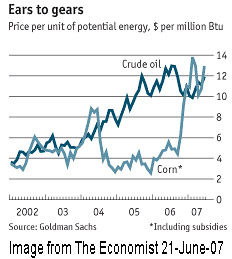UN: biofuels are starving the poor by driving up food prices
UN: biofuels are starving the poor by driving up food prices
mongabay.com
February 14, 2008
|
|
Echoing sentiments increasingly expressed by politicians, scientists, and advocates for the poor, the U.N. Food and Agriculture Organization warned that the world’s poorest people are suffering as a result of the push to use food crops for biofuel production.
“We’re seeing more people hungry and at greater numbers than before,” Josette Sheeran, executive director of the Rome-based World Food Program, said in an interview with The Associated Press. “We’re seeing many people being priced out of the food markets for the first time. For the world’s most vulnerable, it’s extremely urgent.”
Wednesday the FAO said that some 100 million tons of cereals — almost entirely corn — are being diverted to the production of biofuels each year. The drop in grain supplies is causing food prices to surge: U.S. ethanol production have accounted for about one third of the price rise for corn, while the FAO’s global food price index rose 40 percent in 2007 to the highest level on record.
 Price per unit of potential energy, dollars per million Btu. Corn price includes subsidies. |
“Urgent and new steps are needed to prevent the negative impacts of rising food prices from further escalating and to quickly boost crop production in the most affected countries,” said FAO Director-General Jacques Diouf in a press conference in December. “Without support for poor farmers and their families in the hardest-hit countries, they will not be able to cope. Assisting poor vulnerable households in rural areas in the short term and enabling them to produce more food would be an efficient tool to protect them against hunger and undernourishment.”
Sheeran said that the market will eventually adjust to produce more grain to meet demand from biofuels.
“More food will be produced. Farmers will respond, and maybe there’ll be investment in the African farmer for the first time, for example, in many decades,” she said. “When that happens we’ll get increased food in the food supply system. But there’s a lag, so we have people very vulnerable right now who can’t afford the food.”
A spate of recent studies have also warned of the increasingly global impact of biofuels on the environment. Last week two papers published in Science, a prominent scientific journal, linked ethanol and biodiesel production to deforestation and rising greenhouse gas emissions.
UN warns on dangers of bioenergy
Biofuels offer “an extraordinary opportunity” to reduce greenhouse gas emissions but could make “substantial demands on the world’s land and water resources at a time when demand for both food and forest products is also rising rapidly,” said the U.N. in its first assessment on the growing bioenergy industry.
Biofuels demand will increase, not decrease, world food supplies
As concerns mount over fuel-versus-food competition for crops, a Michigan State University ethanol expert says that cellulosic ethanol could render the debate moot.